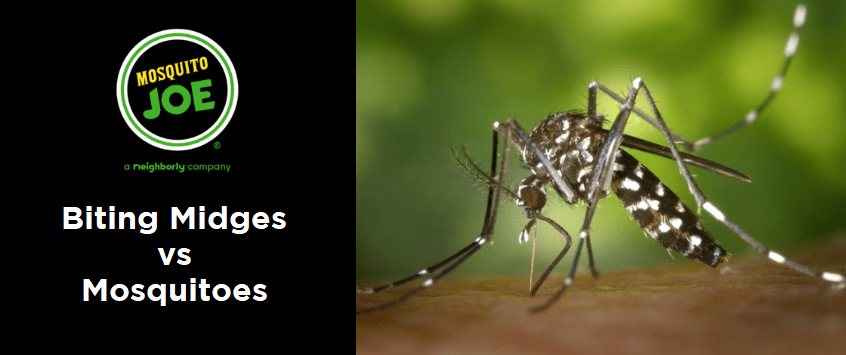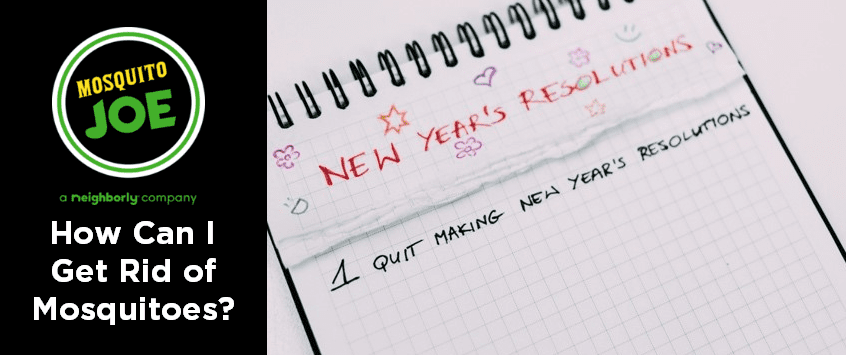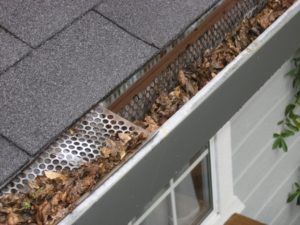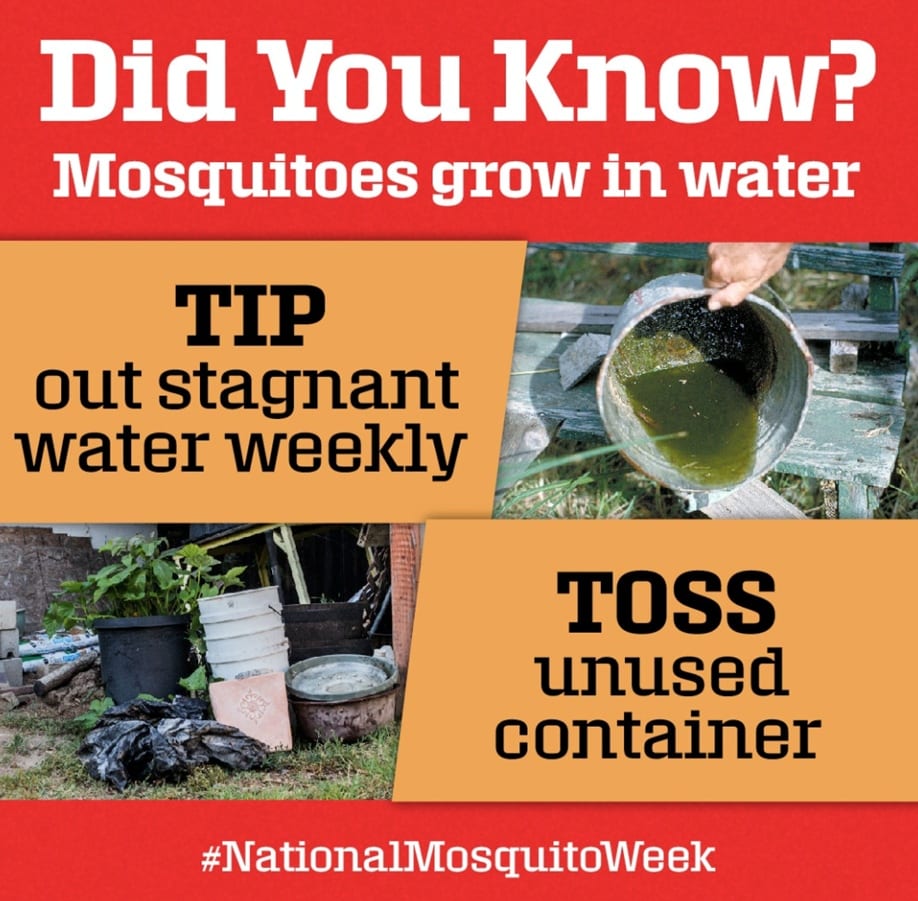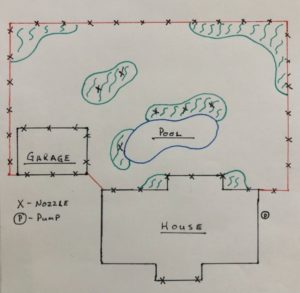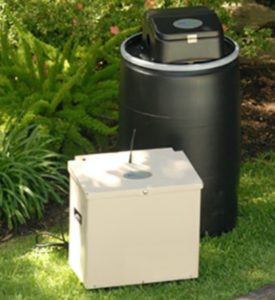Biting Midges
Prior to Hurricane Harvey, biting midges were an issue for our customers in very specific locations – namely around Lake Conroe. Since that time, however, biting midges have become a very real problem for most of our customers. Bryan/College Station has them everywhere, and now we see them as far south as Tomball and as north as Huntsville. Few people have heard of them, so we are here to clear up some misinformation about mosquitoes and help you distinguish the two.
Mosquitoes are dawn and dusk insects because they are unable to regulate their body temperature. The only exception to this is the Asian Tiger mosquito (see photo), which is larger than your average mosquito and has clear black and white stripes on its body. Biting midges are not as affected by the sun, so they will be out all day, mostly in the ground and grass.
Here is how some typical conversations go in the office:
Caller: “Hi, I have mosquitoes everywhere. They are swarming and they are in the house!”
MoJo: “Ok, do you get bitten during the day, maybe more so on your lower legs than elsewhere?”
Caller: “Yes! How did you know that?”
Or
Caller: “Hi, I need help. The baby mosquitoes are really bad at my house, and I can’t go outside without being attacked.”
MoJo: “I’m so sorry – is this all the time, during the day and evening?”
Caller: “Yes! My kids get eaten when they are outside playing or when they swim. They swarm them.”
Or
Customer: “Hi, I don’t think your service is working. I’m still getting bitten and now they are in my house. I think you guys pushed them inside.”
MoJo: “Ok, so please understand that our service kills mosquitoes and won’t push them anywhere. But tell us more so we can help. Are you bitten in the sun during the day? Do you have lots of bites on your legs?”
Customer: “Yes! There are a lot of baby mosquitoes, so I don’t think it’s working.”
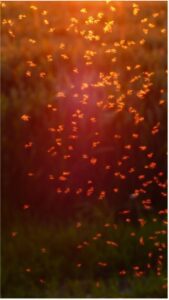 The first thing to know is that there is no such thing as a baby mosquito. Mosquitoes hatch fully grown from pupae. “Baby mosquitoes,” are never mosquitoes and always something else. The second thing to know is that midges live in the ground and grass, which we don’t treat when we treat mosquitoes; since mosquitoes live, shelter, and feed in the green leaf. We ask everyone who calls where they are in their yard when they are bitten, as well as the time of day, so that we can try to drill down to the insects causing them issues. Biting midges are smaller than a mosquito and black in color. They have different wing veining and more feathering on their antennae, but neither of these can be seen when they are flying, so we understand the confusion.
The first thing to know is that there is no such thing as a baby mosquito. Mosquitoes hatch fully grown from pupae. “Baby mosquitoes,” are never mosquitoes and always something else. The second thing to know is that midges live in the ground and grass, which we don’t treat when we treat mosquitoes; since mosquitoes live, shelter, and feed in the green leaf. We ask everyone who calls where they are in their yard when they are bitten, as well as the time of day, so that we can try to drill down to the insects causing them issues. Biting midges are smaller than a mosquito and black in color. They have different wing veining and more feathering on their antennae, but neither of these can be seen when they are flying, so we understand the confusion.
We often hear the comment that they are, “in the house.” While it is totally feasible that a mosquito flies in through an open door, mosquitoes have no desire to be inside. They are far too busy looking for plant nectar to be focused on an open door. If they are focused on biting you, they may follow you in, but unless you keep your door wide open, or have open windows with the lights on at night, mosquitoes have better things to do, like eat and breed.
To understand what is happening we need to appreciate that midges feed off decomposing matter. They love the sludge in gutters, decomposing pine needles and leaves, sludge in your gutters and downspouts, and the sludge in the U-bends of your sinks. When someone calls in with “mosquitoes” in the house, we are confident that the drains are the issue.
There is a super easy trick everyone can do inside, and we recommend this twice a year to everyone:
- Pour 3 “glugs” of household bleach into every drain, shower, tub and sink in the house.
- Let the bleach sit for 5-10 minutes.
- Run your water on hot for 5 minutes in each drain.
- Plug any sinks, tubs etc. that don’t get used much (guest sink for example).
This simple task will flush out the U-bend and clear out any eggs laid there too. Within a week most people report a dramatic difference in their issues.
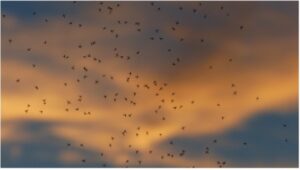 Another consideration is your septic tanks if you are on septic. Those lids will crack over time with mowing or just the sun. Sometimes the septic company does a poor job of sealing the lids back up after a visit. The number of mosquitoes and midges that can come from this one issue can be overwhelming. Take a moment to check your septic tanks – if you open one and a cloud of insects flies out, you know you have an issue with your lid (any insect inside that tank is getting in somehow and getting out to feed).
Another consideration is your septic tanks if you are on septic. Those lids will crack over time with mowing or just the sun. Sometimes the septic company does a poor job of sealing the lids back up after a visit. The number of mosquitoes and midges that can come from this one issue can be overwhelming. Take a moment to check your septic tanks – if you open one and a cloud of insects flies out, you know you have an issue with your lid (any insect inside that tank is getting in somehow and getting out to feed).
To treat for midges, Mosquito Joe will tack an add-on service to your treatment (for this we charge only the cost of the products and time). This involves treating all the ground and grass in addition to our mosquito service. We always request that we coordinate this service with the customer so that the grass is short when we visit, and that they avoid mowing (and thereby cutting off the product) for 4 days after we come. If you would like to learn more about our services or have questions, don’t hesitate to call or email us. We are always here to help: 979-859-5998
 Outside is fun again.
Outside is fun again.
